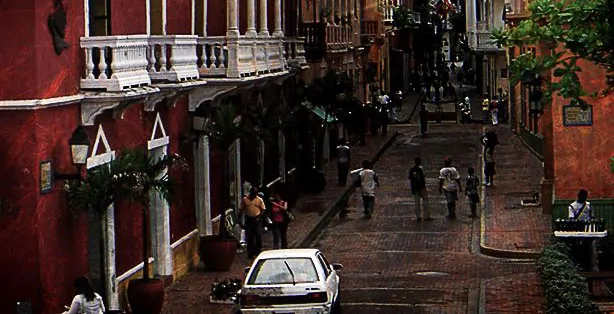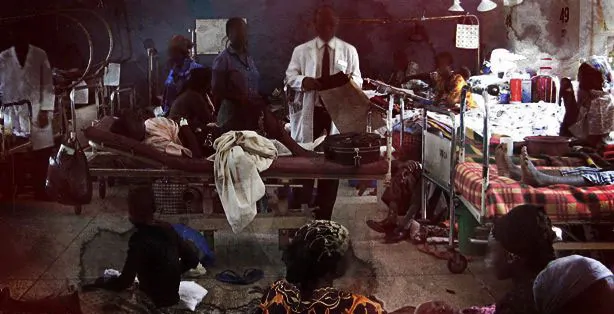
The Island of Tierra Bomba: once colonists’ strategic barrier to the main port of Cartagena, now mostly ignored. Only a small corner containing an ancient fort attracts any attention. As you approach the island by boat from the Old Town of Cartagena, Colombia, you can’t help but notice the trash heaps on the shore, piled next to homes, in the streets.
Colombia had been on my heart for a long time, and since I had heard so much about the mission, I felt drawn to visit—especially after I was told that construction of a permanent clinic was underway. The missionaries responsible, Jorge and Karen Silva, instructed me to get off at Boca Chica’s landing and get a “mototaxi.” I eventually found the landing—indicated by a dilapidated sign—and the taxi—indicated by a rough-looking man following me down the dock, saying: “Taxi? Taxi?”
Riding the Honda “taxi” through the island, I couldn’t help but notice a few things. First, the heat. Even with the breeze from riding on the back of a motorcycle, I could feel beads of sweat sliding down my temples. Next to invade my senses was the filth. Trash was everywhere, the streets were made of cobblestone crafted out of Aguila beer bottle caps, and everything from dogs to pigs to cows were roaming the streets. Finally, as we neared the mission the children came into view. All of them barefoot, playing soccer in a field riddled with cow dung, some of the smaller ones wearing just a pair of ragged underwear or torn shorts.
The sheer numbers were overwhelming. Katherin Henriquez, 20, grew up on the island and now works for the mission they call Project Freedom. She says many fathers cannot afford to provide for all their children for the simple fact there are so many of them. Typically, there is one father per two or three teenage mothers, and up to 10 children, all living in different homes. Some children grow up calling their father “uncle” to avoid confusion.
Crime and poverty often go hand in hand, and Jorge was always traveling between Boca Chica and mainland Cartagena during the construction of the mission. There was a man in Cartagena named Robin Agamez who always asked Jorge for money.
Jorge told the story. “He never robbed me, but he asked me for money all the time. He was very well known … one of the worst guys in the community. I got used to it, year after year. Then one day, for the first time I felt led to talk to him. He was surprised because no one had ever just spoken to him. I asked if he knew he was supposed to live only about 80 years, I told him, ‘You’re at the midpoint of your life, what do you want to do with the other half?’”
That night Jorge took him to a cell group, where he accepted Christ. Just a couple of months later, Robin was working with Jorge at Project Freedom.
Recently, the Silvas have left the mission under the care and directorship of Erika Tovar, who organizes visiting groups, donations and sponsorship. There are now programs to help all of the families in every area, from health care to education. A separate building that will serve as a permanent clinic is now under construction, and the men of the community, young and old, have turned up to help build. There are several families involved in a community development program called Plan Padrino (Plan Godfather) that allows children to attend the local school and provides them with three hearty suppers every week. As part of the same program, separate cell groups were formed for mothers and fathers addressing the main struggles of the community and of raising families. Tools and supplies are provided to the men of the community to dig latrines and lay concrete flooring in their own homes for more sanitary living. Apart from all of that, they give classes on everything from construction to baking. All of which teaches independence and creates opportunities for discipleship and sharing Christ.
“Several of the children [involved in Plan Padrino] have committed themselves to Christ,” Jorge says.
He recounts a story of a young boy named Sammy, 9, who pulled a Nicodemus one night. After a difficult day, the doors of the mission had closed and he came knocking at the door. The boy insisted to see Jorge that night, and finally, when the doors were opened, he said, “I want to accept God into my heart.”
Jorge laughed and asked him if he even knew what that meant. Sammy said, “No, but I can see how it changed the life of ‘Morado.’” Morado is the nickname of Luis, another young boy in the community who had given his life to Christ, and who currently serves at the mission. Sammy wanted what Luis had: Christ in his life.
God’s blessing has been on this mission from the beginning. His provision, if not abundant, has at least met every single need. Jorge calculated nearly 30 boat trips from the mainland to bring the materials to build the mission, including thousands of pounds of quality sand for mixing concrete. Early into the daunting project, he was ready to give up when he prayed. He knew he was not capable of doing this himself.
God answered clearly: “No, you aren’t. But I am.”
Soon after, a friend in the construction business was in the country, and he flew in for two weeks and they started digging the foundation. Digging, they found pure and usable sand. Later, a fruit tree on the compound began to wither and die. When they uprooted it, they found another underground recess with an abundance of sand. The story ends when God produced just enough sand—no more, no less—to build the entire mission, from right beneath their feet.
Author and pastor John Piper says there are only three types of Christians when it comes to world missions: goers, senders and the disobedient. Project Freedom is a product of that obedience, and proof that a big God has time for this small, ignored island.
Emily’s passion is for missions, and for raising awareness about the work that God is doing around the world. She has traveled extensively, working in countries like Mexico, Argentina and Colombia.





















